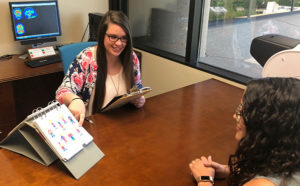AlZHEIMER’S: SELF-EVALUATION OF YOUR MEMORY MAY BE PREDICTIVE
![]() How good is your memory? What you think may be important.
How good is your memory? What you think may be important.
Researchers at the Center for Vital Longevity at the University of Texas at Dallas have determined that subjective complaints about poor memory performance — your own self-evaluation of your memory — could be a helpful early marker for the onset of a mild cognitive decline, which they said sometimes foreshadows Alzheimer’s disease.
That’s particularly relevant for people ages 60 and older.
Research by Karen Rodrigue’s lab at the center was published recently in Psychology and Aging, and it examined subjective memory complains in almost 200 healthy adults ages 20 to 94, according to UTD.

Psychological sciences doctoral student Marci Horn (left) conducts a name-face memory test as part of a study at the Center for Vital Longevity. [Photo courtesy of UTD]
The study found that a person’s intuitive assessment of their own memory actually was a reliable predictor of performane on the laboratory memory assessment.
“Our findings show that subjective memory can be a reliable indicator of memory performance, even in cognitively healthy adults,” said Marci Horn, a psychological sciences doctoral student who served as lead study author, in a release. “The same people who self-report memory problems may also have other risk factors associated with increased risk of Alzheimer’s disease.”
Find out more here.
WEARABLE FITNESS MONITORS MAY AID IN CANCER PATIENT ASSESSMENT
Researchers at UT Southwestern’s Simmons Cancer Center say that wearable fitness trackers may be useful tools in evaluating and treating cancer patients.
The trackers measure steps taken each day. In a pilot study, older cancer patients wore the physical activity monitors for 10 weeks or more.
The study showed that data from the PAMs correlated with a clinician assessment of the patients’ statuses. That’s helpful because evaluating a patient’s status is a key part of clinical encounters and affects decisions on treatment, according to UT Southwestern.
You can find out more about the study in Cathy Frisinger’s report here.
RESEARCHERS STUDY OVARIAN HORMONE-BLOOD CHOLESTEROL BALANCE

Subhrangsu Mandal
What’s the link between ovarian hormones and the blood cholesterol balance in the body? That’s what researchers at the University of Texas at Arlington are trying to determine.
The correlation is a key factor of cardiovascular health or disease, they said.
“Premenopausal women are less likely to develop heart disease than their male peers, but this difference disappears after menopause,” Subhrangsu Mandal, a UTA associate professor of chemistry and biochemistry, said in a release. “We are investigating the biochemical mechanism associated with the role of the ovarian hormones in regulating the cholesterol balance in the blood, with an aim to open up new therapeutic avenues for the treatment of cardiovascular disease.”
Mandal, and co-investigator Linda Perrotti, a UTA neuroscientist and associate professor of psychology, recently received a $439,360 grant from the National Institutes of Health to support their work.




























